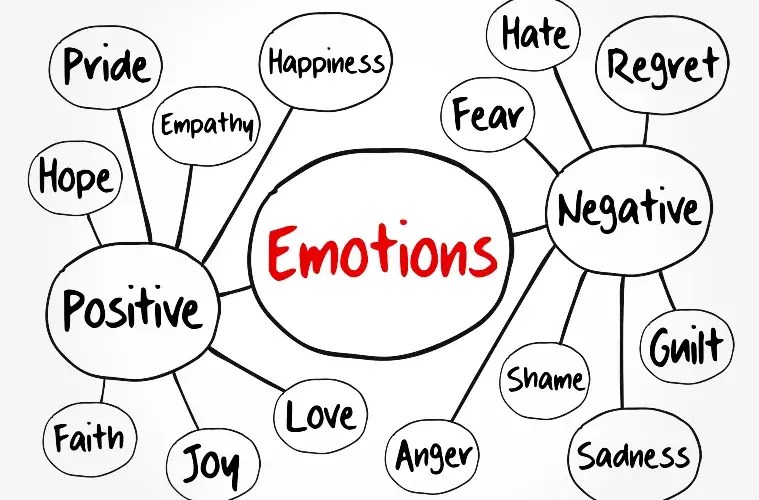Globally, people are turning to social media to escape from their realities. While this often provides some respite, it instils the notion that we have to dodge any semblance of a negative feeling or that we ‘shouldn’t’ experience it. Not only does this make us feel agitated at ourselves when we do experience the emotion, but also affects our ability to tolerate and manage any amount of distress/discomfort.
We spoke to Dishaa Desai, a Psychologist & Outreach Associate at Mpower – The Centre, Mumbai to know more about how to deal with negative emotions and what to unlearn from what we know about them. She started off by talking about a case study and explained,
A 27-year-old individual reported feeling frustrated and lonely during the lockdown; both expected and human reactions. However, she expressed guilt at it since she has ‘so much to be grateful for, doesn’t have to fight for survival’ and felt that her reactions were not valid. Today, everywhere one seeks recluse, there are people encouraging you to “be grateful”, “positively manifest what you want and it will happen”, “good vibes only” flooding our screens and minds, inducing immense guilt, frustration and shame at feeling even a hint of negative emotion (toxic positivity, essentially).
And so today, we are taking into account the need for introspection at our mental wellbeing and understanding why exactly would we want to embrace the universal discomfort caused by negative emotions! It’s not always sunshine and rainbows when it comes to our emotions, and that’s perfectly fine. And here’s why:

All Emotions Serve A Purpose. And No, This Is Not Some Cliched Phrase.
Biologically speaking, negative emotions can actually be healthy for us. They serve as a warning system. Let’s take fear for example, in dangerous situations, fear sends an alarm through our brain and body to prepare us to deal with the situation and to be alert about the changes in the environment around us, in the first place. It also ensures that we take less risky decisions that may impact our safety and well-being.
Thankfully, humanity has moved past the point of looking out for such primitive threats. But this is the same system that kicks into action with threats today (such as walking in a dark alley) by making one alert and in a fight or flight mode.
Additionally, there are other emotions that can lead to discomforts such as sadness, disappointment or even frustration. While these may be slightly more difficult to process, studies have shown that they also aid in assessing objective reality and eventually help one learn from one’s mistakes.
For instance, if you have experienced rejection by a job you were vying for, you might feel dejection and frustration. While it might feel personal, after some processing of what happened, feeling these emotions would lead you to focus on what you can do to improve in the future i.e. focus on what you can control.
Experiencing and managing such uncomfortable emotions also facilitates one’s distress tolerance in many crises that may arise and helps build resilience. It equips us with keen awareness and comprehension of our emotions and positive coping mechanisms.
This can only happen when we experience the emotions rather than avoiding them as this hinders the development of healthy emotional resilience.
As this pandemic has shown us, there is an immense privilege in being able to turn away from negative emotion, which can indeed disappear just as easily. There are people all over the world who have to confront their realities on a daily basis, not just as a result of COVID-19, but due to extreme poverty, living in conflict-ridden areas, battling terminal health concerns to name just a few examples.
It is vital not to avoid negative emotions (which is barely possible) when they arise, but to understand and cope with them.

This Brings Us To The ‘How’
First, understand that negative emotions are universal, healthy and essential for our functioning, as uncomfortable as the experience is, and coming to terms with this will make the process less distressing.
The next step in this journey is to take cognizance of what you are feeling i.e. physiological and emotional experience from a place of understanding contrary to judgment. This could be by checking in with yourself about what you might be experiencing rather than shaming yourself for it. For instance, the first form of self-talk could appear first labelling the emotion and then asking yourself where it might come from and what led to it vis-a-vis judgmental self-talk that would make you feel terrible about experiencing it in the first place.
If there is physiological distress, we can deal with it in ways that work for you. This could be through grounding activities, movement, and box breathing, for instance. Here’s another case study to explain it further:
A 24-year-old individual experienced panic attacks, leaving her overwhelmed and confused. On uncovering the deeper layers, she identified that her primary way to cope was to avoid. While it worked to provide relief temporarily, it was not making a dent in her cumulative emotional distress. Identifying that, for her, this was rooted in her fear of unpredictable change, in her field of medicine, helped her understand her own experience while in turn led us to explore how she could comfortably cope with these uncomfortable emotions.
Once you feel physiologically calm, you will have space for emotional processing. The process could entail labelling the emotion, examining what it represents/what it signifies and identifying what you need to cope healthily.
According to Psychologist and Professor Todd Kashan,
Embracing the necessity of all emotions, has the benefit of ’emotional agility’, which looks at harnessing one’s emotional awareness in every situation and adapting well.
It is certainly easier said than done and there is a very fine balance to be struck between wallowing and creating space for negative emotions that will differ from person to person.
Join the Girl Tribe by MissMalini App to be a part of the conversation. Explore the app!

